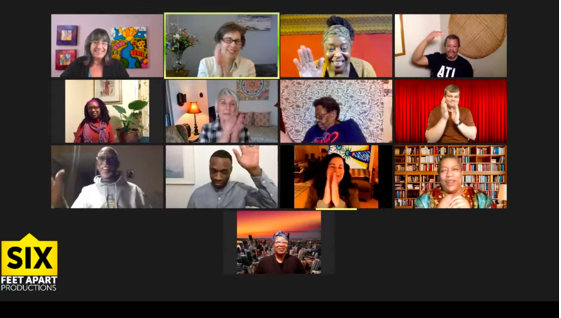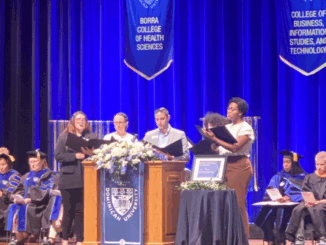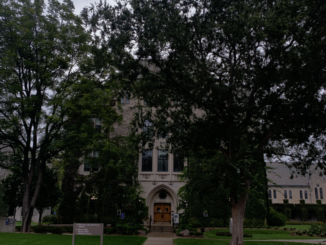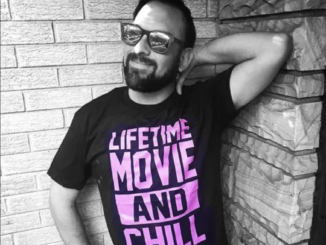
By Azhley Rodriguez
To celebrate the first Saturday in Black History Month this year, Six Feet Apart Productions hosted the “Black Stories Matter” event for Black storytellers to spread the message that Black history is American history.
Six Feet Apart Productions was created to share entertainment in a time of self-isolation and social distancing.
Dominican University provided access to the event. Pay-what-you-can contributions went to the National Association of Black Storytellers.
The night began with a rendition of the Black National Anthem “Lift Ev’ry Voice and Sing” sang by the Standford Talisman, an acapella group at Standford University. American writer and civil rights activist James Weldon Johnson originally wrote the song as a poem, and his brother J. Rosamond Johnson composed the music in 1899.
The national Negro hymn is now known as the Black national anthem, which Talisman Director John Okhiulu called “a protest, a hymn and a prayer of profound significance for our people.”
The master of ceremonies was Sheila Arnold, a storyteller since 2003 and the manager of History’s Alive!, which is a mentoring program for performers, educators and inspirational speakers.
In her opening remarks, Arnold spoke on the struggles of marginalized people and the importance of learning to make social change.
Wayne Harris, an award-winning solo performer, retired educator and musician, told the first story about his father’s lesson on the value of living life to the fullest.
Harris narrated his time spent in the hospital after contracting polio as a child. His father brought him tubs of ice cream every night and shared stories of American folk hero John Henry, who was a role model for Wayne.
Devan Standiford, a published writer and founder of Unreeling Storytelling — a Brooklyn-based organization that inspires people to share their hard truths — shared his moment of realization.
He told the story of experiencing firsthand the hard truth of racial profiling when he was just 12. When he and his friends went into a convenience store to buy candy, the white owner accused him of stealing.
Recalling moments like the Central Park Five and people like Trayvon Martin who were wrongly accused of crimes solely based on their skin color, Standiford advocated for an effort to wake up and realize these injustices cannot go unnoticed.
Muriel Johnson has been a storyteller for 20 years from Maryland to Cape Town, South Africa. She introduced the audience to the story of her father-in-law, who was raised in Tennessee at the peak of Jim Crow Laws.
During his childhood, Johnson’s father-in-law and his friend would get rushed into someone’s home if they were playing outside when someone was lynched. Then, he and the other kids in the neighborhood wouldn’t see people who looked like them being lynched.
In 2012, Johnson followed Trayvon Martin’s case and recalled the day she found out there were no charges brought again his killer George Zimmerman. This is when she realized that the culture and society of the 1940s is no different than American society today.
“They say time heals all wounds,” she said. “But how do you heal a wound that keeps getting assaulted? How do you heal a wound when every day there’s a new wound? I just wanna know, when is it gonna be our time?”
Johnson left viewers speechless and in tears.
A teary-eyed Diane Ferlatte was the last of the storytellers. A Grammy-nominated woman, she has told stories for over thirty years using song, sign language, humor and audience participation. She shares her own twist on historical and personal stories, folktales and other oral traditional stories to illustrate the struggles and triumphs of African Americans.
She told the story of Henry “Box” Brown, who was born in 1816 into slavery and escaped to freedom in a box in Philadelphia at the age of 33. She narrated the story with different voices to represent different people in the timeline and featured live background banjo music by Erick Pearson.
arodriguez2@my.dom.edu



